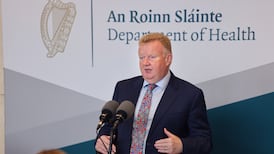With 65 suspected cases of the novel coronavirus in the State testing negative so far according to the latest figures, Ireland continues to ride on the right side of the wave of the global infectious disease epidemic. The illness has just been formally named Covid-19 (coronavirus), giving it the equivalent nomenclature of Sars and Mers- albeit without containing the geographic or clinical information of its predecessor coronaviruses. The virus itself continues to be known as 2019-nCoV.
It is unlikely we will escape without at least one confirmed case. With person-to-person transmission now a reality, the case could come from a person who has travelled from China, or via someone who has been in contact with a case here in Europe. A number of confirmed cases in the UK originated from contact in a European skiing resort, for example.
The novel coronavirus has triggered an epidemic – the term used when a higher than normal number of cases of an infection are found in a specific location over a particular period of time. For an epidemic to become a pandemic, there must be evidence of a global spread and a much greater number of cases. At present some 99 per cent of Covid-19 cases are inside China.
A pandemic could overwhelm even the most developed health services in the world; however the World Health Organisation (WHO) policy of containment is holding the line at present. But what could our health system offer a person who develops Covid-19?
For someone with mild symptoms of the disease, quarantine and nursing care in a suitable facility may suffice. Basic supportive care including a good fluid intake, rest and paracetamol will be provided. In the best-case scenario, the person’s condition would not deteriorate and their own immune system would essentially fight off the coronavirus.
At the other end of the spectrum, someone who presents with a high fever and signs of pneumonia will require more intensive treatment. Consultant respiratory and infectious disease physicians, working alongside specialist intensivists, will, with nursing colleagues, begin intensive care. This could involve ventilation and other invasive procedures aimed at keeping the patient alive.
There is currently no anti-viral drug proven to work against this latest version of the coronavirus to pose a threat to human health. But we do have a range of drugs that are effective against other viruses such as hepatitis C, HIV and influenza.
Doctors may decide to use one of these drugs on an experimental basis when faced with a patient who is gravely ill. Antiviral drugs work by interfering with the virus’s ability to enter our cells, disrupting its ability to hijack our cellular machinery in order to replicate, or preventing it from escaping infected cells.
A potential treatment for Covid-19 is an antiviral treatment initially developed to combat the Ebola virus. The drug, called remdesivir, has been shown to work against the Mers virus in mice. Significantly, it was given to the first patient in the US diagnosed with Covid-19, who went on to recover within days. But doctors cannot be sure if remdesivir was the reason for the patient’s recovery.
Ribavirin is a drug approved for the treatment of hepatitis C (HCV) and respiratory syncytial virus (RSV) that has been tested in patients with Sars and Mers; whether it offers sufficient potency against 2019-nCoV is uncertain but it may well emerge as a possible treatment.
We do not have many broad-spectrum antiviral drugs, so researchers are likely to focus on developing an agent that targets a particular feature of 2019- nCoV.
What about a vaccine to help stem the virus spread? Work has commenced on developing one, but it would be ground-breaking if an effective and safe vaccine emerged before June.








